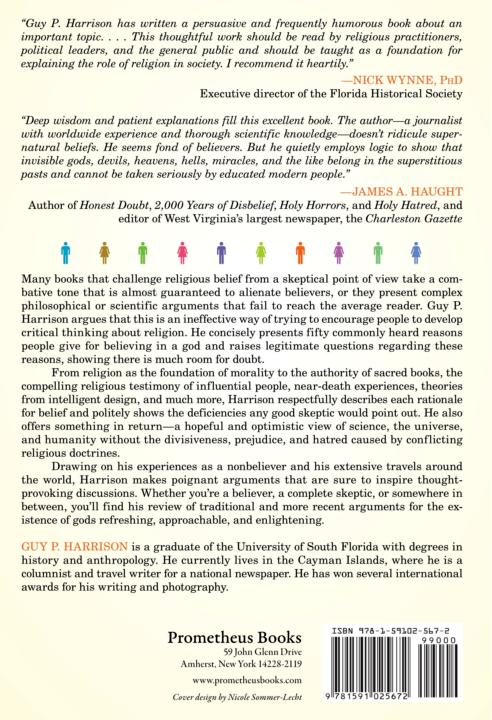50 Reasons People Give for Believing in a God (48 page)
Read 50 Reasons People Give for Believing in a God Online
Authors: Guy P. Harrison

I wish that I could offer my own life as a shining example of how
one can go from devout believer to atheist and end up happy, but I
cannot because I don't feel that I was ever fully convinced that gods
were real. Even as a child when my sweet mother dragged me to church
on Sundays, I questioned and I doubted. I sincerely searched for a god
to believe in as a young adult but came up empty again. I have traveled
widely and visited the world's most sacred places. I touched holy
ground, rubbed blessed stones, inhaled incense, listened to chants, and
even sang and prayed with believers. Faith healers have placed their
hands on my body and I touched the sacred rock above Adam's supposed resting place. I believe that I have searched for the gods more
sincerely and more thoroughly than most people who have ever lived.
But for all my travels and efforts I found only believers and no gods.
I probably have been an atheist my entire life, even as a child, but
was so busy trying to believe that I never noticed. I once worried that
not believing in any of these gods my fellow humans offered would
make me a bad person or hinder my life in some way. But I know now
that one can have a wonderful life without believing in gods. I am still
as passionately curious about my world and my universe as I was
when I was a little boy. I could live for a thousand years and never run
out of things to do. But what about true believers? Can one believe in
a god deeply and still have happiness and fulfillment when that belief
goes away? Dan Barker, the Christian preacher who became an
atheist, says yes. Perhaps his journey provides a better example than
mine for believers.
The reason I am happy is because I choose to be happy. For me, happiness is primarily a state of mind and since I now control my own mind, I also control my own happiness. I am no puppet of a higher
mind, no slave to eternity. I never knew real joy before I regained
possession of my own mind. (Barker 1992, 228)
There is joy in rationality, happiness in clarity of mind. Free thought
is thrilling and fulfilling-absolutely essential to mental health and
happiness. You cannot freely give or receive love until you first love
yourself; and you cannot love yourself if your only claim to worth
comes as an undeserved gift from a "merciful" dictator.
I have lived the Christian life. I prefer now to live my own life.
(Barker 1992, 230)
Barker is directing these statements to Christianity, his former religion, but the message applies to all beliefs. There really is joy to be
found in living one's life free from an intimidating god who, after all,
was probably only imaginary anyway.
Finally, believers can be reassured that they will not be swallowed
up by a gaping hole in the earth if they take the plunge into reason and
come up for air over on the side of atheism. Many millions of atheists
today are living happy, positive lives. They are doctors, teachers,
police officers, firefighters, construction workers, soldiers, peace
activists, mommies, and daddies. They are much like anybody else.
The only difference is that they don't look to gods for strength.
Instead, they look within themselves or they reach out to family and
friends. Atheists don't run crying to gods in times of crisis. They are
more likely to lean on their fellow humans and appreciate them more
for it. There is nothing to support the believers' charge that atheists
lead sad lives that are somehow diminished by the absence of gods. I
think the opposite might be true. If anything, atheists are more likely
to enjoy every minute of their precious lives. It may well be that atheists are in a better position to smell more flowers and hug their children a little tighter than those who believe they live in a god's shadow.
Perhaps it is atheists who are more alive than anyone. But, then again,
not believing is no guarantee of anything. A person who becomes an
atheist may change a lot or change very little.
Believers can dismiss the idea that becoming an atheist separates
them from everyone else. Atheists are more common than most people
imagine, and most of them are probably far more boring and normal
than anyone would suspect. The typical believer who becomes an
atheist is likely to find that they are still the same person, at least initially. Becoming an atheist simply means you no longer believe gods
are real. That's all there is to it. It is the universe around you that seems
to change because you finally see it for what it really is: a big, beautiful, scary, and inspirational place. Atheism only opens your eyes and
puts both your feet on the ground.
The rest is up to you.
RECOMMENDED READING
Barker, Dan. Losing Faith in Faith: From Preacher to Atheist. Madison, WI:
Freedom From Religion Foundation, 1992.
Free Inquiry. http://www.secularhumanism.org. An outstanding magazine
that promotes critical thinking, skepticism, and humanism.
Kurtz, Paul. Living without Religion: Eupraxsophy. Amherst, NY:
Prometheus Books, 1994. An excellent book capable of calming those
who are worried about life with no gods.
Skeptical Inquirer. http://www.csicop.org/si. Another great periodical; challenges paranormal claims and pseudoscience.

